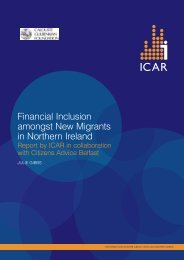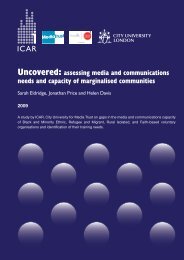The Somali community in the UK: What we know and how we ... - ICAR
The Somali community in the UK: What we know and how we ... - ICAR
The Somali community in the UK: What we know and how we ... - ICAR
You also want an ePaper? Increase the reach of your titles
YUMPU automatically turns print PDFs into web optimized ePapers that Google loves.
s<strong>in</strong>ce <strong>the</strong> late 1980s have come ma<strong>in</strong>ly from <strong>the</strong><br />
South. This means that <strong>the</strong>ir language <strong>and</strong> culture<br />
cuts <strong>the</strong>m off from ma<strong>in</strong>stream British society, an<br />
decreases <strong>the</strong>ir access to education <strong>and</strong><br />
employment <strong>in</strong> <strong>the</strong>ir new environment<br />
<strong>The</strong> numbers <strong>in</strong>volved, <strong>and</strong> <strong>the</strong>ir particular<br />
circumstances, have placed dem<strong>and</strong>s on statutory<br />
<strong>and</strong> voluntary services - <strong>and</strong> so generated research.<br />
Why is it, <strong>the</strong>n, that <strong>the</strong>re is still said to be so little<br />
<strong>in</strong>formation on <strong>Somali</strong>s? One reason has to do with<br />
<strong>the</strong> social <strong>in</strong>visibility of <strong>Somali</strong>s mentioned above.<br />
Compare this profile with <strong>the</strong> African-Caribbean<br />
<strong>community</strong>. Both groups suffer racism, but African-<br />
Caribbeans are perceived to be part of British<br />
society. <strong>The</strong>ir music <strong>and</strong> mores have permeated<br />
British youth culture, whilst behaviour traditionally<br />
expected of young <strong>Somali</strong>s conflicts with <strong>the</strong>se<br />
values. It is not <strong>the</strong> volume of research on African-<br />
Caribbeans (although this is considerable) that<br />
gives <strong>the</strong>m a public presence, but <strong>the</strong>ir high visibility<br />
<strong>in</strong> <strong>the</strong> wider society. <strong>Somali</strong>s too are rendered<br />
visible largely through <strong>the</strong>ir dress. But <strong>the</strong> social<br />
distance bet<strong>we</strong>en <strong>Somali</strong>s <strong>and</strong> <strong>the</strong> <strong>in</strong>digenous<br />
British culture <strong>in</strong>creases <strong>the</strong>ir isolation. <strong>The</strong>re<br />
is <strong>the</strong>refore a dissonance bet<strong>we</strong>en <strong>the</strong> amount<br />
of <strong>in</strong>formation which actually exists, <strong>and</strong> what is<br />
believed to be <strong>know</strong>n.<br />
<strong>The</strong> assumption of ignorance about <strong>Somali</strong>s is<br />
also connected to <strong>the</strong> nature of <strong>the</strong> material itself.<br />
With a few exceptions, research is conta<strong>in</strong>ed <strong>in</strong><br />
brief, small-scale studies, often undertaken by local<br />
authorities or non-governmental organisations<br />
(NGOs). Many of <strong>the</strong>se rema<strong>in</strong> <strong>in</strong> duplicated<br />
form, are not widely distributed, <strong>and</strong>, as already<br />
mentioned, are extraord<strong>in</strong>arily hard to obta<strong>in</strong>. All<br />
too often, local authorities, NGOs, <strong>and</strong> RCOs who<br />
have produced a report have no <strong>know</strong>ledge of it<br />
a few years later, let alone spare copies. In general,<br />
<strong>in</strong>formation is fragmented, poorly catalogued, <strong>and</strong><br />
badly circulated.<br />
Given this apparent disregard of much <strong>in</strong>vestigation,<br />
it is hard to imag<strong>in</strong>e that ostensibly policy-oriented<br />
reports have always resulted <strong>in</strong> action. It would<br />
be <strong>in</strong>structive to follow up <strong>in</strong>dividual reports to<br />
see <strong>in</strong> each case what measures had been taken <strong>in</strong><br />
respect of recommendations. Certa<strong>in</strong>ly, although<br />
<strong>the</strong>re may be <strong>in</strong>ternal assessment documents by<br />
local authorities <strong>and</strong> NGOs, it is strik<strong>in</strong>g that those<br />
that reach <strong>the</strong> public arena tend to reiterate <strong>the</strong><br />
problems which <strong>the</strong> <strong>community</strong> experience, ra<strong>the</strong>r<br />
than monitor projects <strong>and</strong> evaluate <strong>the</strong>ir progress.<br />
<strong>The</strong> repetition of f<strong>in</strong>d<strong>in</strong>gs <strong>and</strong> duplication of<br />
recommendations have not resulted <strong>in</strong> consistent<br />
practice based on a shared corpus of research.<br />
A recognised body of good practice would go<br />
towards build<strong>in</strong>g a wider underst<strong>and</strong><strong>in</strong>g of <strong>the</strong><br />
<strong>Somali</strong> <strong>community</strong> at a local <strong>and</strong> national level<br />
Associated with <strong>the</strong> problem of dissem<strong>in</strong>ation <strong>and</strong><br />
use of <strong>in</strong>formation is <strong>the</strong> perennial problem of <strong>the</strong><br />
gulf bet<strong>we</strong>en academia <strong>and</strong> commissioned reports.<br />
Although <strong>the</strong> growth of discipl<strong>in</strong>es such as applied<br />
anthropology <strong>and</strong> development studies is improv<strong>in</strong>g<br />
matters, <strong>the</strong>re has always been a mutual disregard<br />
bet<strong>we</strong>en policy-oriented <strong>in</strong>vestigation <strong>and</strong> <strong>the</strong><br />
academy - bet<strong>we</strong>en NGOs <strong>and</strong> <strong>the</strong> universities.<br />
<strong>The</strong> most substantial ethnography <strong>we</strong> have on<br />
<strong>Somali</strong>s <strong>in</strong> <strong>the</strong> <strong>UK</strong>, David Griffiths’ <strong>Somali</strong> <strong>and</strong><br />
Kurdish refugees <strong>in</strong> London (2002) makes full use of<br />
reports on To<strong>we</strong>r Hamlets, his ethnographic field.<br />
But <strong>in</strong> <strong>the</strong> extensive bibliography of Rima Berns<br />
McGown’s fasc<strong>in</strong>at<strong>in</strong>g Muslims <strong>in</strong> <strong>the</strong> diaspora: <strong>The</strong><br />
<strong>Somali</strong> communities of London <strong>and</strong> Toronto (1999)<br />
such material is absent, <strong>and</strong> she laments <strong>the</strong> lack of<br />
‘systematic research’.<br />
<strong>The</strong> significance of type of research for<br />
<strong>know</strong>ledge about <strong>Somali</strong>s <strong>in</strong> <strong>the</strong> <strong>UK</strong><br />
Although <strong>the</strong>y conta<strong>in</strong> a great deal of essential<br />
<strong>in</strong>formation, <strong>the</strong> fact that much of what is publicly<br />
<strong>know</strong>n about <strong>Somali</strong>s comes <strong>in</strong> <strong>the</strong> form of<br />
reports also has a profound effect on <strong>the</strong> way <strong>the</strong><br />
<strong>community</strong> is seen <strong>and</strong> perceives itself. <strong>The</strong> agenda<br />
of much research is determ<strong>in</strong>ed from <strong>the</strong> outset -<br />
to identify difficulties <strong>and</strong> suggest solutions. In <strong>the</strong>se<br />
policy-based documents, <strong>Somali</strong>s are presented <strong>in</strong><br />
terms of <strong>the</strong> obstacles <strong>the</strong>y face, as ‘problems’, or<br />
victims of circumstance. Indigenous <strong>Somali</strong> culture<br />
expects a high degree of self-reliance from both<br />
men <strong>and</strong> women with<strong>in</strong> <strong>the</strong> context of accepted<br />
relationships of authority, so this <strong>in</strong>vestigative angle<br />
flies <strong>in</strong> <strong>the</strong> face of an ideal <strong>Somali</strong> self-perception<br />
ra<strong>the</strong>r than act<strong>in</strong>g as an agent of empo<strong>we</strong>rment.<br />
<strong>The</strong> <strong>Somali</strong> <strong>community</strong> <strong>in</strong> <strong>the</strong> <strong>UK</strong><br />
13

















